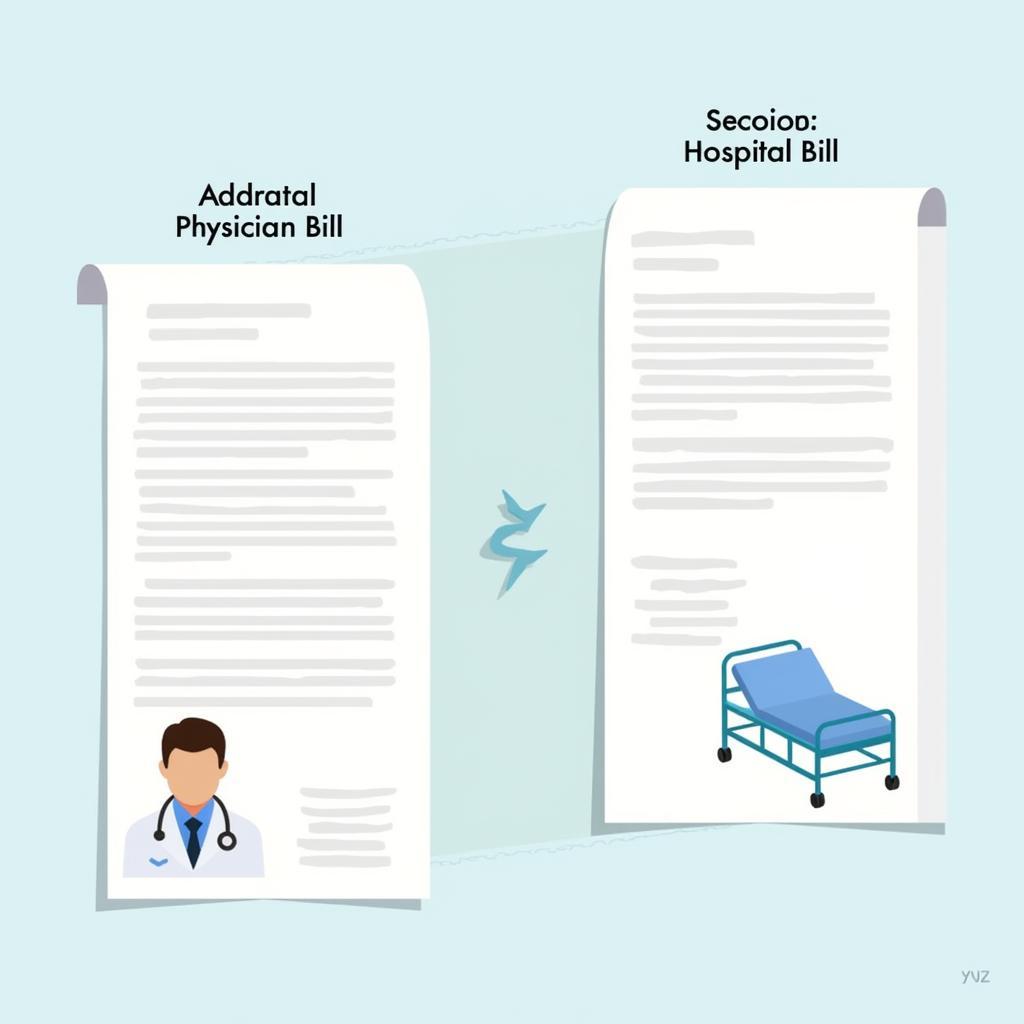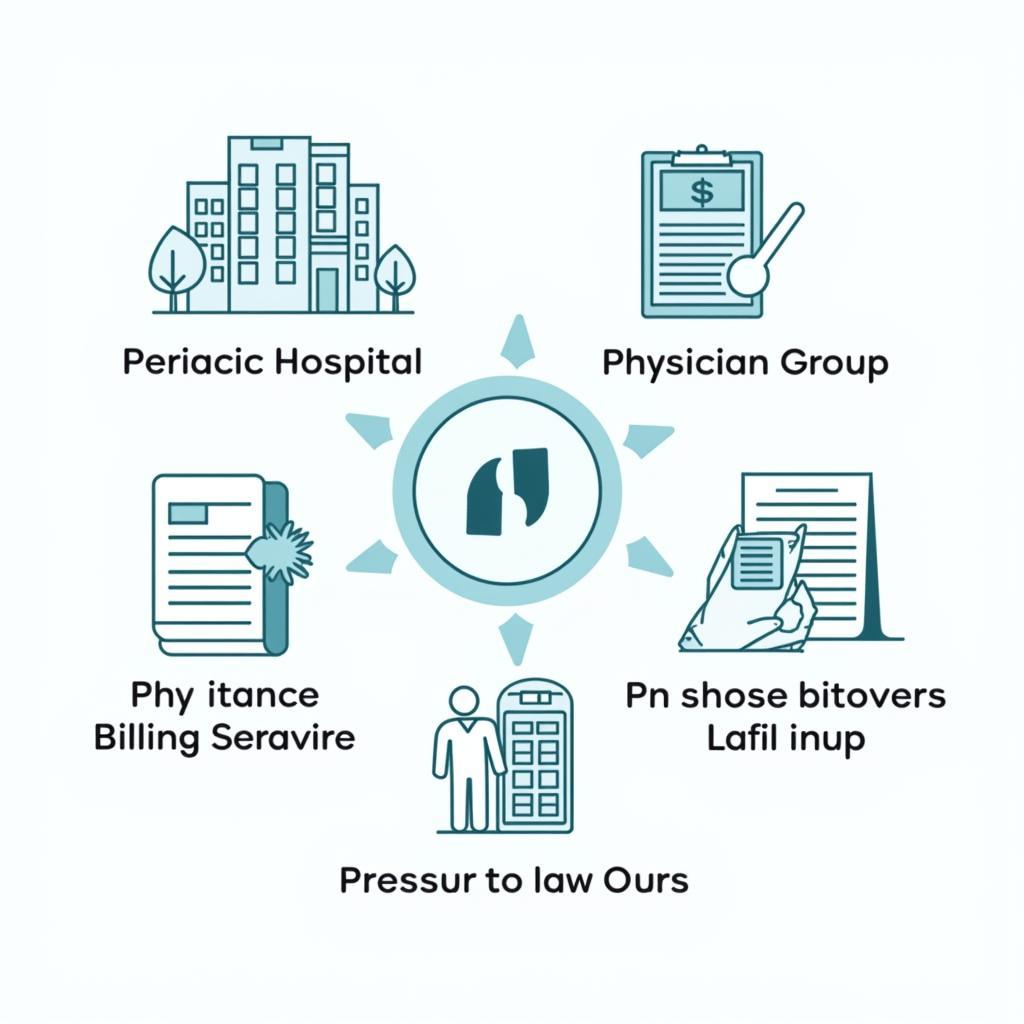Understanding the difference between a physician bill and a hospital bill can often be confusing. This article aims to clarify the distinctions between these two types of bills, helping you navigate the often complex world of medical billing. We’ll explore the various components of each bill, common reasons for separate billing, and tips for managing these expenses. After reading this, you’ll be equipped to understand and manage your medical bills more effectively.
Decoding Your Medical Bills: Physician vs. Hospital
Physician bills and hospital bills cover different services provided during your medical care. While you might receive care in a hospital setting, the physicians providing that care are often separate entities, billing independently for their services. Understanding this fundamental difference is key to deciphering your medical expenses.
What Does a Physician Bill Cover?
A physician bill covers the professional services provided by doctors involved in your care. This includes consultations, examinations, diagnoses, treatments, and surgical procedures. Think of it as payment for the doctor’s expertise and time. For example, if you had surgery, the surgeon, anesthesiologist, and any other specialist involved would each submit their own separate bills. These bills might also include charges for services provided in clinics or private offices.
What Does a Hospital Bill Cover?
The hospital bill, on the other hand, covers the facility-related costs associated with your care. This encompasses the use of hospital resources, such as operating rooms, recovery rooms, nursing care, medications administered within the hospital, medical equipment, lab tests conducted at the hospital, and room and board if you were admitted as an inpatient. Essentially, the hospital bill covers the infrastructure and support services that facilitate your treatment. You can learn more about specific hospital billing practices by looking at resources like mammoth hospital billing.
 Physician and Hospital Bills Explained
Physician and Hospital Bills Explained
Why Are Physician and Hospital Bills Separate?
The separation stems from the fact that physicians and hospitals often operate as independent entities. Physicians, even those working within a hospital, may be employed by a separate medical group or operate their own private practice. This structural independence necessitates separate billing systems. Think of it like going to a restaurant within a hotel – you pay the hotel for your room and the restaurant for your meal.
Common Reasons for Separate Billing
- Independent Practices: Many physicians maintain independent practices and are not directly employed by the hospital.
- Specialized Services: Different specialists, such as anesthesiologists, radiologists, and pathologists, bill separately for their specific services.
- Administrative Efficiency: Separate billing systems allow for better tracking and management of revenues for both physicians and hospitals.
If you’re exploring employment opportunities in the healthcare sector, researching resources like brandon regional hospital jobs can be beneficial.
 Separate Medical Bills Explained
Separate Medical Bills Explained
Managing and Understanding Your Medical Bills
Dealing with medical bills can be daunting. Here are some tips for navigating the process effectively:
- Review Your Bills Carefully: Check for accuracy and ensure all listed services were actually received.
- Ask Questions: Don’t hesitate to contact the billing departments of both the physician’s office and the hospital if you have any questions or discrepancies.
- Negotiate Payment Plans: If you are facing financial difficulties, explore payment plan options with both the physician and the hospital.
- Keep Records: Maintain organized records of all your medical bills, payments, and correspondence.
Understanding emergency room wait times can be crucial for time-sensitive medical needs. Resources like christiana hospital er wait time offer valuable insights.
 Managing Medical Expenses
Managing Medical Expenses
Conclusion
Understanding the difference between physician bills and hospital bills is crucial for managing your healthcare expenses. By recognizing the distinct services covered by each bill and being proactive in reviewing and questioning them, you can navigate the complexities of medical billing with greater confidence. Remember, seeking clarification and negotiating payment plans are always viable options. Understanding your medical bills ensures you’re paying for the services you received. Knowing the difference between Physician Bill Vs Hospital Bill empowers you to take control of your healthcare finances.
For information on other hospital-related resources, you can check out resources like rehab hospital of montana. Additionally, if you’re looking for compensation insights in the healthcare industry, resources such as mercy hospital pay schedule 2024 pdf can be helpful.
FAQ
- Why do I receive two separate bills for a hospital visit? Because the physician and hospital operate as separate entities, they bill independently for their services.
- What if I disagree with charges on my physician or hospital bill? Contact the respective billing department to discuss the discrepancies and seek clarification.
- Can I negotiate payment plans for medical bills? Yes, both physicians and hospitals often offer payment plan options, especially for patients facing financial hardships.
- What is included in a physician bill? A physician bill includes charges for the doctor’s professional services, such as consultations, examinations, and procedures.
- What is included in a hospital bill? A hospital bill covers the facility-related costs, including room and board, nursing care, and use of medical equipment.
- Why is it important to understand the difference between these bills? Understanding the difference enables you to effectively manage your healthcare expenses and ensure accuracy in billing.
- What should I do if I receive a bill for services I didn’t receive? Immediately contact the billing department to dispute the charges and provide supporting documentation.
Contact Us
For assistance with any healthcare needs, please contact us: Phone: 02437655121, Email: irccsanjose@gmail.com. Or visit us at: 298 Cau Dien Street, Minh Khai Ward, Bac Tu Liem District, Hanoi, Vietnam. We have a 24/7 customer support team.
 using WordPress and
using WordPress and